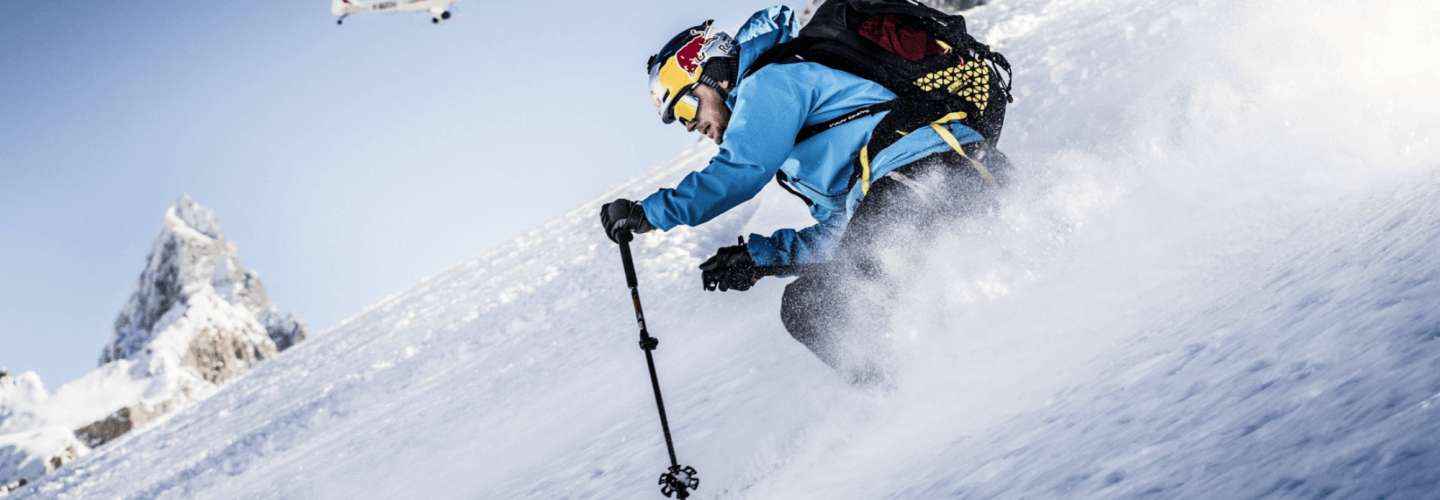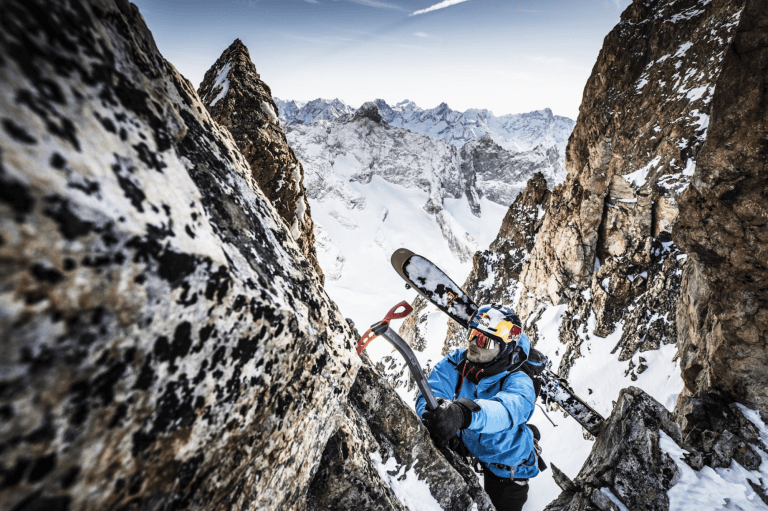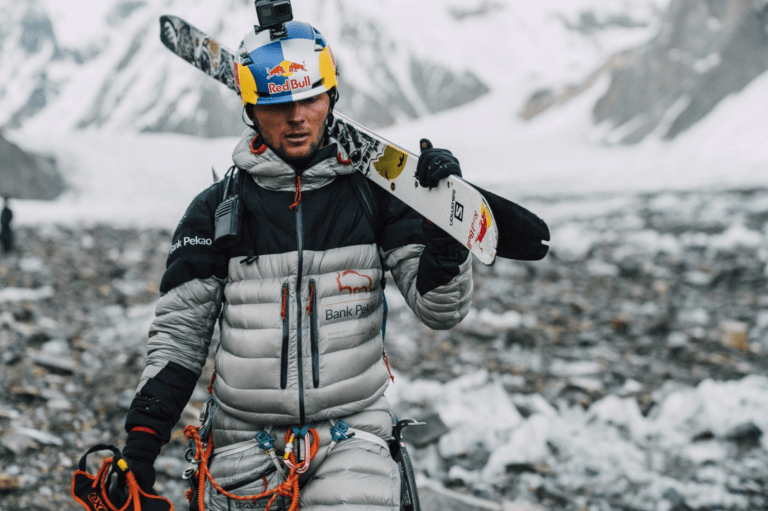Polish ski mountaineer Andrzej Bargiel, made history in 2018 when he became the first to successfully complete a ski descent of the world’s second highest peak, K2, a feat which others had died trying. Now planning to be the first to summit and ski down Everest without using supplementary oxygen, Red Bull have now released an incredible free-to-view hour-long film K2: The Impossible Descent of Bargiel’s stunning K2 achievement.
ITS> How are able to function above 8,000 metres when most other people who make it up there need oxygen?
AB> “Definitely being at high altitude requires good endurance and I’ve trained for years, I’ve been going to the mountains for years and also trying to raise my endurance and I also have some skills for this so I highly benefit from the physical side of it. Definitely you have to filter the oxygen from the air while being so high. When you read books about mountaineering people describe the experience like being on the edge or hallucinating, I definitely feel much calmer and I feel better – maybe this is because of my pre-expeditions or maybe it’s because of the training I’ve done?”
ITS> The virus stopped your plans for Everest in 2020 too but do you still hope to do it?
AB> “Definitely I am planning to do this but because of the pandemic situation this will be postponed – most of the high mountains are in Asia and the situation due to the virus spread is most challenging there. So over the summer I focussed on the Alps, doing some training there. It’s all very unexpected so will wait and see how it will develop but all this makes me think that patience is something that I need to work on as well – and all of us do
ITS> Your brother’s use of drones on K2 shown in the film was very intelligent and impressive. Are there are any other ways in which you may make use of drones in future expeditions?
AB> “I am sure that this technology brings up a lot of safety because on high altitudes with high mountains there are no rescue teams so with this technology we can prevent some elements and also monitor and I hope that in the future the treatment will also be bigger so there will be bigger access to food, drugs, tents or ropes for the expeditions and I think this is a great value for the expedition – not only the beautiful videos and beautiful shots we can make but also for raising safety and improving safety issues and I am also very happy that my brother can master this skill because for years he was going with me to the expeditions with me and helping me, but he really made it to the higher level – I am really happy for him.”
ITS> In the film it says that you had a lot of brothers and sisters. Are all also super fit sportsmen too or do they had more ‘regular’ jobs?
AB> I have a big family, I have to admit – I have 3 brothers and 7 sisters – but only three of us do the mountaineering and more people are into artistic skills, but this is great this diversity as we can learn from each other and inspire each other
ITS> With the danger of a serious accident from the slightest error so high when you are alone on skis on these very high, very steep slopes how do you keep focus and not get too afraid to even start?
AB> “Definitely a key element is preparation of the whole line of the descent, I was there with my team many times to check the direction, to be sure that it was physical and safe, so the more often you go somewhere the more you familiarise with the place, the more you’re comfortable you feel – so for me the descent itself was just a realisation of the plan because at that point I was aware that it was physical, but it was just a task to perform, but a lot of work had to be done prior to this
ITS> It seems from the various ski descents of the world’s fourteen 8,000m peaks last year, all have been skied now except the world’s third and fifth-highest peaks, Kangchenjunga (8586m) and Makalu (8485m), both in Nepal. Do you have any plans to ski them?
AB> You are right these are two peaks that have not yet been skied from – and they are both very difficult. Of course, I’ve been thinking about them I think they are both do-able, and we’ll see what the future brings. Maybe I will have this opportunity – definitely it’s interesting both personally and professionally but we’ll see.”
ITS> Do you have a ‘typical year’ but I wondered if you were now full time planning and training for expeditions so it fills all year, or do you have time to do anything else?
AB> “Of course I tend to spend time with my girlfriend, with my family – I try to have time to myself but when it comes to the expeditions the most challenging part is the logistics and the planning because they are both very costly and it takes up a lot of my time, but also when it comes to training I diversify, I cycle, I climb, I run, also basic training and bicycle, and that is what allows me to meet up with my friends and also have fun whilst training – of course the closer I get to the expedition the more task orientated it becomes, so I focus on this more.”
ITS> What are the most important things for people to master if they want to climb and ski big mountains? Where do you start?
What I want to say to people that want to start is that if it’s possible and it’s good to start small, with baby steps – spend a lot of time in the mountains and get used to it – don’t start big because you have to learn the basics, you have to develop your skills and give yourself time to learn the basics before moving onto bigger things later.”
ITS> Are there aspects of your expeditions that are very important but people watching the film might not even think about?
AB> “Definitely what people might not see is that it was very difficult to organise the second expedition after the first one failed. It really was very hard work, people might not also notice how difficult it was the resignation from the first expedition, you know putting a stop to it – so I think this is very important to be aware of this – that I went through a very long way, made very hard work with many sacrifices, but the descent itself and the climb really was a great compensation for the all effort.”
ITS> There are sometimes reports that the big mountains like Everest are getting too busy, in some ways because it has got ‘easier’ to climb them as equipment and facilities have improved. Do you agree with this and do you think there is any way to improve it or it will just become a bigger problem?
AB> “I think that the problem is going to develop because we cannot stop people from wishing to accomplish their dreams. We cannot say that some people can but other people cannot go and definitely everyone would like to go to the mountains and find it very peaceful with no people, but it’s not as easy. People who found companies who get the expeditions to 8,000m mountains should definitely work on the safety and improve the rescue teams. This will improve the situation and I think that it will be less dangerous and this will be a bigger advantage for everyone, and also we all should take care about taking waste, taking everything that we bring up to the mountain – not to leave this negative footprint because the more people go to the mountains, the bigger is our impact. But I think that mountains are so big that everyone can find the place for them to feel great and to feel peaceful, so we should not bend people from reaching their goals.”
ITS> What do you enjoy doing besides climbing and skiing very big mountains?
“Apart from my passion I love to spend time with my family, I love that I have a big family – I love to spend time with my girlfriend just to relax – I can go to the lake or read a book, it’s time to myself it’s a break from my intense life and I can really recover and re-charge my batteries.”





